Barry Moore says Democrats “have been out to get Trump since he came down the escalator”

On Monday night, former President Donald Trump was indicted by a Fulton County, Georgia grand jury for charges dating back to 2020, accusing the former President and 18 of his attorneys, advisors, and affiliates of conspiring to unlawfully overturn the results of the 2020 election. Congressman Barry Moore (R-AL02) – who has endorsed Trump for President – took to Twitter on Tuesday to denounce the prosecution of Trump and his team. “The United States had never before indicted a former president, and now Biden’s Department of Justice and weaponized blue state prosecutors have indicted President Trump four times in a matter of months,” Moore said on Twitter. As they continue their quest to throw their chief political opponent in jail, Democrats have joined the likes of Maduro and Noriega,” Rep. Moore wrote on Twitter. “They have been out to get President Trump since he came down the escalator, and Americans can see through this desperate sham.” Moore, a member of the House Judiciary Committee that is investigating alleged influence peddling by the President’s son, Hunter Biden, and allegations that Biden himself may have received payoffs from foreign sources while he was Vice President – has suggested that the indictments of Trump are part of a plan by Democrats to distract attention from those hearings. “JUST IN: The Biden family received more than $20 million from oligarchs in Russia, Ukraine, and Kazakhstan while he was VP,” said Moore on Twitter. “Biden dined with these oligarchs and spoke with them on the phone 20 separate times. The indictments are just a distraction from the real story.” Most Republicans dismiss the Trump indictments as partisan politics. U.S. Senator Tommy Tuberville (R-Alabama) called them a “sham” and a “witch hunt” in a statement on Tuesday. Some Trump opponents, on the other hand, claim that he should not be allowed on the ballot due to the legal controversy. William Baude and Michael Stokes Paulsen claim that by challenging the results of the 2020 election, Trump is guilty of participating in an insurrection between the election and the certification of the Electoral College votes on January 9, 2021, and is thus barred from holding public office under the post-Civil War Fourteenth Amendment. Trump has already made history as only the third President in the country’s history to be impeached by the House of Representatives and the only President to be impeached twice. Like Bill Clinton and Andrew Johson before him, Trump was not convicted by the Senate. Trump is the sixth one-term President since 1900 to lose reelection. The others are William Howard Taft in 1912, Herbert Hoover in 1932, Gerald Ford in 1976, Jimmy Carter in 1980, and George H. Bush in 1992. If Trump wins the Republican nomination for President and then is elected to a nonconsecutive term in 2024, he would be the first to accomplish that since Grover Cleveland. Moore is serving in his second term representing Alabama’s Second Congressional District. To connect with the author of this story or to comment, email brandonmreporter@gmail.com.
7 Republicans vote to convict Donald Trump in impeachment trial

Seven Republicans voted Saturday to convict former President Donald Trump in his Senate trial, easily the largest number of lawmakers to ever vote to find a president of their own party guilty at impeachment proceedings. While lawmakers acquitted Trump of inciting the Jan. 6 Capitol attack, they voted 57-43 to convict him — short of the two-thirds majority needed to find him guilty. Still, with seven Republicans joining all 50 Democrats in voting “guilty,” the Senate issued an unmistakable bipartisan chorus of condemnation of the former president that could have political implications for a GOP conflicted over its future. “If I can’t say what I believe that our president should stand for, then why should I ask Alaskans to stand with me?” Sen. Lisa Murkowski of Alaska told reporters. Besides Murkowski, other Republican senators voting against Trump were Richard Burr of North Carolina, Bill Cassidy of Louisiana, Susan Collins of Maine, Mitt Romney of Utah, Ben Sasse of Nebraska, and Patrick Toomey of Pennsylvania. Underscoring the perils of affronting Trump and his legions of GOP loyalists, by late evening top Republicans from at least two of the defecting senators’ states had blasted them. Pennsylvania GOP Chairman Lawrence Tabas issued a statement saying he shared “the disappointment of many of our grassroots leaders and volunteers” over Toomey’s vote. Louisiana’s Republican Party said, “We condemn, in the strongest possible terms” Cassidy’s vote and said its executive committee voted unanimously to censure him. Democrats holding out long-shot hopes of convicting Trump would have needed 17 Republicans to prevail, which as expected proved an unreachable goal. That hope died after the influential Senate Minority Leader Mitch McConnell, R-Ky., said he would vote to acquit because he believed lawmakers had no jurisdiction over a former president. Even so, McConnell delivered searing words against Trump in a speech after the vote, saying the former president was “practically and morally responsible” for provoking the attack on lawmakers as they formally certified Trump’s Electoral College defeat by Joe Biden. Five people died, and the House impeached Trump for inciting insurrection. Most of the defecting Republicans had clashed with Trump over the years. Burr and Toomey have said they will retire and not seek reelection when their terms expire next year, and Murkowski and Collins have histories of clashing with Trump over health care and other policies. Perhaps the day’s most surprising GOP defector was Burr, a 16-year Senate veteran who keeps a low profile in Washington and after years as top Republican on the Senate Intelligence Committee is used to telegraphing little about his views. Burr, 65, will not seek reelection next year and will retire. In a written statement, he said Trump made unfounded claims about a fraud-riddled election “because he did not like the results.” He said Trump used the presidency to “inflame” the rioters rather than urging them to stand down. “The evidence is compelling that President Trump is guilty of inciting an insurrection against a coequal branch of government,” Burr said. Also striking was the “guilty” vote by Cassidy, who was reelected in November from a deep-red state where GOP support is widespread. Cassidy, 63 and a physician, had initially sided with the vast majority of Senate Republicans who voted last month to block the trial from moving forward. But he blasted a shambolic performance by Trump’s legal team at the start of the trial while praising Democrats for presenting a compelling case. “Our Constitution and our country is more important than any one person. I voted to convict President Trump because he is guilty,” Cassidy said in a one-sentence statement issued after his vote to convict. Toomey, a traditional conservative, decried Trump’s efforts to overturn election results — Trump’s targets include Toomey’s Pennsylvania — and to encourage his supporters’ march on the Capitol. “All of this to hold on to power despite having legitimately lost,” Toomey said. He said that because of Trump’s actions, “for the first time in American history, the transfer of presidential power was not peaceful” and said Trump had “betrayed the confidence millions of us placed in him.” Sasse has long criticized Trump’s authoritarian streak. Last week he excoriated pro-Trump Republican Party officials in his home state, telling them in a video message that “politics isn’t about the weird worship of one dude.” “Tribalism is a hell of a drug, but our oath to the Constitution means we’re constrained to the facts,” Sasse said Saturday. He said he wouldn’t vote against his own conscience “simply because it is politically convenient.” Romney’s “guilty” vote at Trump’s initial impeachment trial last February made him the first senator to ever vote to convict a president of the same party. The trial that ended Saturday was Trump’s second — making him the first president to ever be tried twice for impeachment — and the fourth in presidential history. Presidents Andrew Johnson in 1868 and Bill Clinton in 1999 were acquitted and received unanimous support from their Democratic Party. Republished with the permission of the Associated Press.
Donald Trump trial gets go-ahead after emotional, graphic first day

House prosecutors on Tuesday wrenched senators and the nation back to the deadly attack on Congress as they opened Donald Trump’s historic second impeachment trial with graphic video of the insurrection and Trump’s own calls for a rally crowd to march to the iconic building and “fight like hell” against his reelection defeat. The detailed and emotional presentation by Democrats was followed by meandering and occasionally confrontational arguments from the Trump defense team, which insisted that his remarks were protected by the First Amendment and asserted that he cannot be convicted as a former president. Even Trump’s backers in the Senate winced, several saying his lawyers were not helpful to his case. The senators sitting as jurors, many of whom fled for safety themselves the day of the attack, watched and listened, unable to avoid the jarring video of Trump supporters battling past police to storm the halls, Trump flags waving. While many minds are made up, the senators will face their own moment to decide whether to convict or acquit Trump of the sole charge of “incitement of insurrection.” The heavy emotional weight of the trial punctuates Trump’s enduring legacy as the first president to face an impeachment trial after leaving office and the first to be twice impeached. The Jan. 6 Capitol siege stunned the world as hundreds of rioters ransacked the building to try to stop the certification of Democrat Joe Biden’s victory, a domestic attack on the nation’s seat of government unlike any in its history. Five people died. “That’s a high crime and misdemeanor,” Rep. Jamie Raskin, D-Md., declared in opening remarks. “If that’s not an impeachable offense, then there’s no such thing.” Trump’s lawyers insist he is not guilty, his fiery words just figures of speech. In a key early test, senators rejected an effort by Trump’s allies to halt the trial, instead affirming the Senate’s authority under the Constitution to decide the case. They voted 56-44 to confirm their jurisdiction, ruling that impeaching a president after he leaves office is constitutionally permissible. Six Republicans joined the Democrats. Security remained extremely tight at the Capitol on Tuesday, a changed place after the attack, fenced off with razor wire and with armed National Guard troops on patrol. The nine House managers walked across the shuttered building to prosecute the case before the Senate. White House press secretary Jen Psaki said Biden would not be watching the trial of his predecessor. “Joe Biden is the president, he’s not a pundit, he’s not going to opine on back and forth arguments,” she said. With senators gathered as the court of impeachment, sworn to deliver impartial justice, the trial started with the Democratic House managers’ gripping recollections, as they described police officers maimed in the chaos and rioters parading in the very chamber where the trial was being held. Trump’s team countered that the Constitution doesn’t allow impeachment at this late date. Though the trial now proceeds, that’s a legal issue that could resonate with Republicans eager to acquit Trump without being seen as condoning his behavior. Lead lawyer Bruce Castor said he shifted his planned approach after hearing the prosecutors’ opening and instead spoke conversationally to the senators, saying Trump’s team would do nothing but denounce the “repugnant” attack and “in the strongest possible way denounce the rioters.” He appealed to the senators as “patriots first,” and encouraged them to be “cool-headed” as they assess the arguments. Trump attorney David Schoen turned the trial toward starkly partisan tones, saying the Democrats were fueled by a “base hatred” of the former president. Republicans made it clear that they were unhappy with Trump’s defense, many of them saying they didn’t understand where it was going — particularly Castor’s opening. Louisiana Sen. Bill Cassidy, who voted with Democrats to move forward with the trial, said that Trump’s team did a “terrible job.” Maine Sen. Susan Collins, who also voted with Democrats, said she was “perplexed.” Sen. Lisa Murkowski of Alaska said it was a “missed opportunity” for the defense. The early defense struggles also underscored the uphill battle that Trump’s lawyers face in defending conduct that preceded an insurrection that senators themselves personally experienced. Though they will almost certainly win Trump’s acquittal — by virtue of the composition of the Senate — they nonetheless face a challenge of defanging the emotion from a trial centered on events that remain raw and visceral, even for Republicans. At one pivotal point, Raskin told his personal story of bringing his family to the Capitol the day of the riot, to witness the certification of the Electoral College vote, only to have his daughter and son-in-law hiding in an office, fearing for their lives. “Senators, this cannot be our future,” Raskin said through tears. “This cannot be the future of America.” The House prosecutors had argued there is no “January exception” for a president to avoid impeachment on his way out the door. Rep. Joe Neguse, D-Colo., referred to the corruption case of William Belknap, a war secretary in the Grant administration, who was impeached, tried and ultimately acquitted by the Senate after leaving office. If Congress stands by, “it would invite future presidents to use their power without any fear of accountability,” he said. On the vote, six Republicans joined with Democrats pursue the trial, just one more than on a similar vote last week. Cassidy joined Collins, Murkowski, Mitt Romney of Utah, Ben Sasse of Nebraska, and Pat Toomey of Pennsylvania. But the total of 56 was still far from the two-thirds threshold of 67 votes that would be needed for conviction. It appears unlikely that the House prosecutors will call witnesses, in part because the senators were witnesses themselves. At his Mar-a-Lago club in Florida, Trump has declined a request to testify. Presidential impeachment trials have been conducted only three times before, leading to acquittals for Andrew Johnson, Bill Clinton and then Trump last year. Because of the COVID-19 crisis, senators were allowed to spread out, including in the “marble room” just off
Donald Trump defenders push ‘no crime’ as Democrats seek removal
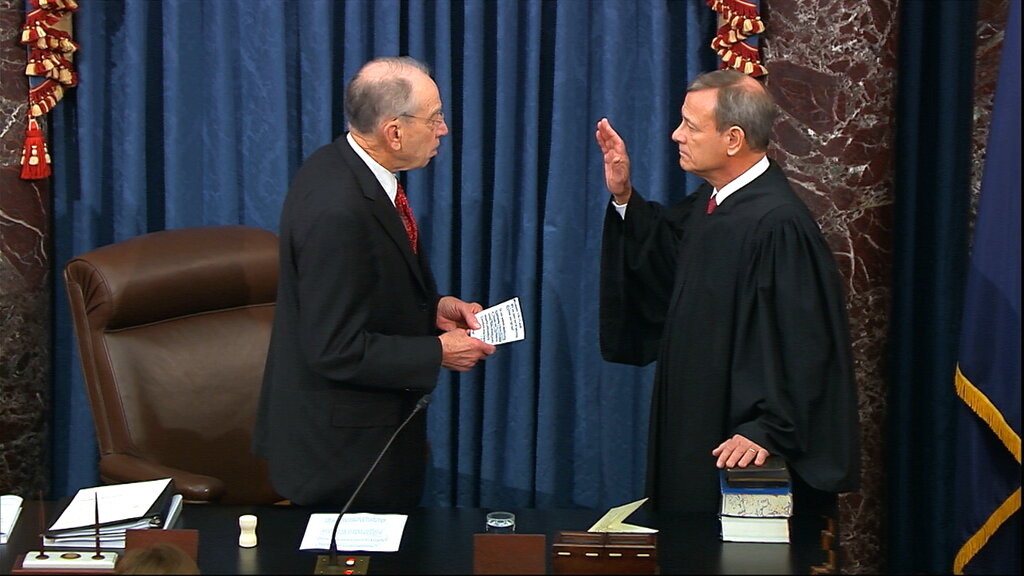
This approach stems from a letter written in 1868.
No escape: Senators to be quiet, unplugged for Donald Trump impeachment trial

Senators will begin each day with a proclamation: “All persons are commanded to keep silence, on pain of imprisonment.”
Donald Trump’s impeachment trial begins, senators vow ‘impartial justice’

Senators said later that when Roberts appeared the solemnity of the occasion took hold.
Senate takes over Donald Trump’s impeachment after House handoff
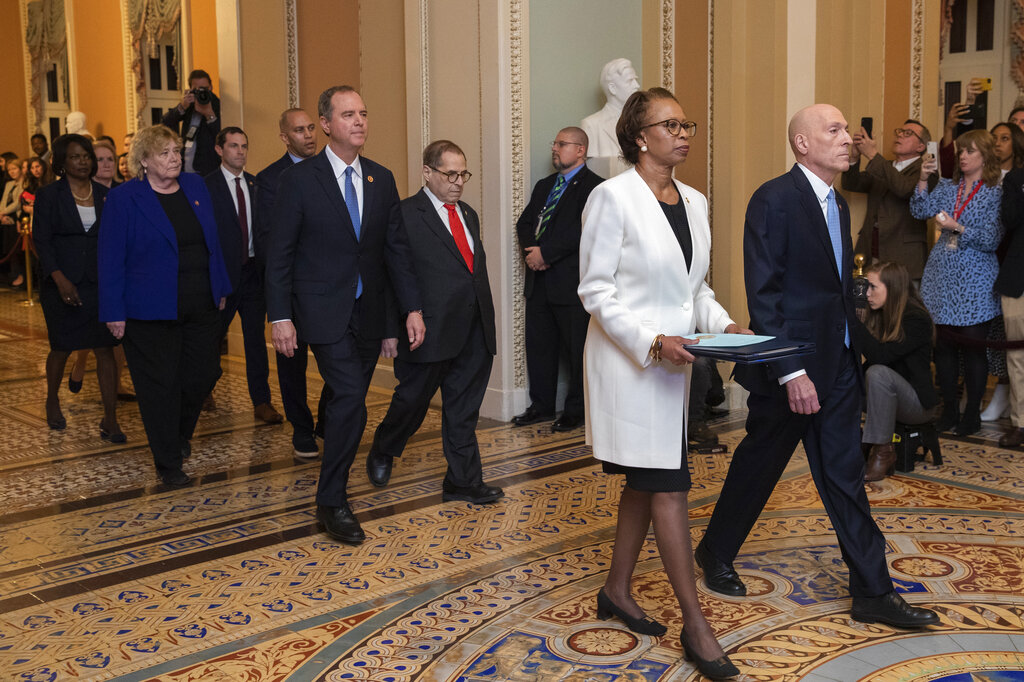
The team of impeachment managers escorted the document to the Senate in a dramatic procession.
Donald Trump impeached by U.S. House on 2 charges
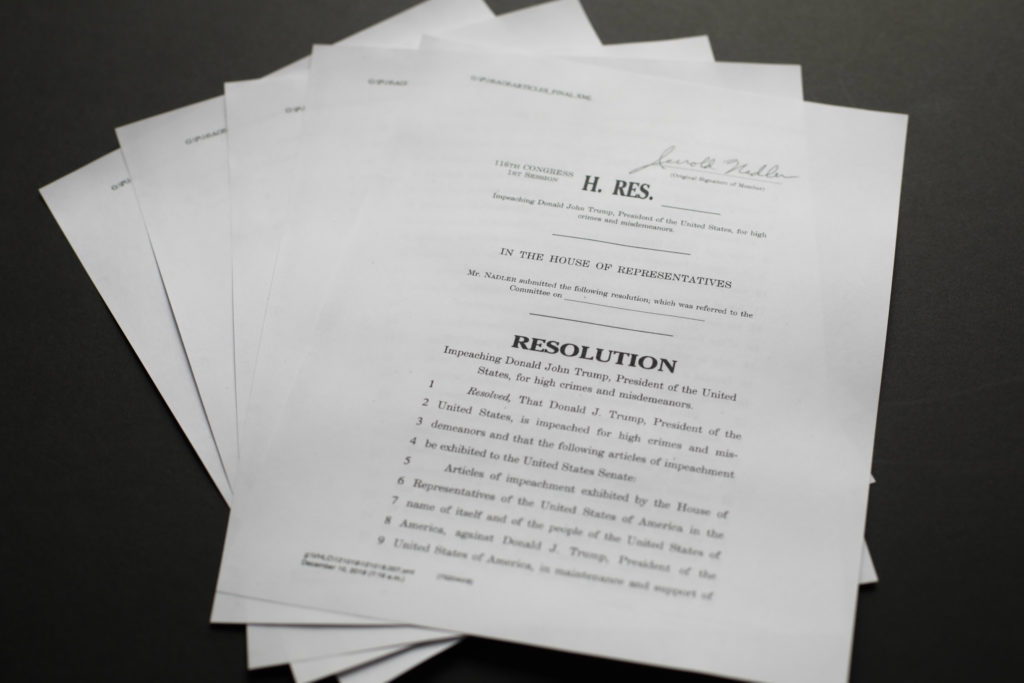
President Donald Trump was impeached by the U.S. House of Representatives Wednesday night, becoming only the third American chief executive to be formally charged under the Constitution’s ultimate remedy for high crimes and misdemeanors. The historic vote split along party lines, much the way it has divided the nation, over a charge that the 45th president abused the power of his office by enlisting a foreign government to investigate a political rival ahead of the 2020 election. The House then approved a second charge, that he obstructed Congress in its investigation. The articles of impeachment, the political equivalent of an indictment, now go to the Senate for trial. If Trump is acquitted by the Republican-led chamber, as expected, he still would have to run for reelection carrying the enduring stain of impeachment on his purposely disruptive presidency. He saw the blame flowing the other direction. He told a political rally in Michigan that “crazy Nancy Pelosi’s House Democrats have branded themselves with an eternal mark of shame.” The votes were 230 for impeachment and 197 against on the first count, 229-198 on the second. Democrats led Wednesday night’s voting, framed in what many said was their duty to protect the Constitution and uphold the nation’s system of checks and balances. Republicans stood by their party’s leader, who has frequently tested the bounds of civic norms. Trump called the whole affair a “witch hunt,” a “hoax” and a “sham,” and sometimes all three. The trial is expected to begin in January in the Senate, where a vote of two-thirds is necessary for conviction. While Democrats had the majority in the House to impeach Trump, Republicans control the Senate and few if any are expected to diverge from plans to acquit the president ahead of early state election-year primary voting. Pelosi, once reluctant to lead Democrats into a partisan impeachment, gaveled both votes closed, risking her majority and speakership to follow the effort to its House conclusion. “Today we are here to defend democracy for the people,” she said earlier during floor debate. Trump, who began Wednesday tweeting his anger at the proceedings, pumped his fist before an evening rally in Battle Creek, Michigan, boasting of “tremendous support” in the Republican Party and saying, “By the way it doesn’t feel like I’m being impeached.” No Republicans voted for impeachment, and Democrats had only slight defections on their side. Voting was conducted manually with ballots, to mark the moment. On the first article, abuse of power, two Democrats, Rep. Jeff Van Drew of New Jersey, who is considering switching parties to become a Republican, and Rep. Collin Peterson of Minnesota voted against impeaching Trump. On the second article, obstruction, those two and freshman Rep. Jared Golden of Maine voted against. Democratic Rep. Tulsi Gabbard of Hawaii, who is running for president, voted “present” on both. What Pelosi called a sad and solemn moment for the country, coming in the first year that Democrats swept control of the House, unfolded in a caustic daylong session that showcased the nation’s divisions — not only along party lines, but also by region, race and culture. The House impeachment resolution laid out in stark terms the two articles of impeachment against Trump stemming from his July phone call when he asked the Ukraine president for a “favor” — to announce it was investigating Democrats ahead of the 2020 election. He also pushed Ukrainian President Volodymyr Zelenskiy to probe unsubstantiated corruption allegations against Joe Biden, the former vice president and 2020 White House contender. At the time, Zelenskiy, a young comedian newly elected to politics, was seeking a coveted White House visit to show backing from the U.S. ally as it confronts a hostile Russia at its border. He was also counting on $391 million in military aid already approved by Congress. The White House delayed the funds, but Trump eventually released the money once Congress intervened. Narrow in scope but broad in its charge, the resolution said the president “betrayed the nation by abusing his high office to enlist a foreign power in corrupting democratic elections,” and then obstructed Congress’ oversight like “no president” in U.S. history. “President Trump, by such conduct, has demonstrated that he will remain a threat to national security and the Constitution if allowed to remain in office,” it said. Republicans argued that Democrats are impeaching Trump because they can’t beat him in 2020. “This vote is about one thing, and one thing only: They hate this president,” said Rep. Chris Stewart, R-Utah. “They want to take away my vote and throw it in the trash.” But Democrats warned the country cannot wait for the next election to decide whether Trump should remain in office because he has shown a pattern of behavior, particularly toward Russia, and will try to corrupt U.S. elections in 2020. “The president and his men plot on,” said Chairman Adam Schiff, Democrat-California, of the Intelligence Committee that led the inquiry. “The danger persists. The risk is real.” The outcome brings the Trump presidency to a milestone moment that has building almost from the time the New York businessman-turned-reality-TV host unexpectedly won the White House in 2016 amid questions about Russian interference in the U.S. election — and the rise of the “resistance.” Democrats drew from history, the founders and their own experiences, as minorities, women and some immigrants to the U.S., seeking to honor their oath of office to uphold the constitution. Rep. Lou Correa, Democrat-California, spoke in Spanish asking God to unite the nation. “In America,” said Rep. Hakeem Jeffries, Democrat-New York, “no one is above the law.” Republicans aired Trump-style grievances about what Arizona Rep. Debbie Lesko called a “rigged” process. “We face this horror because of this map,” said Rep. Clay Higgins, Republican-Alabama, before a poster of red and blue states. “They call this Republican map flyover country, they call us deplorables, they fear our faith, they fear our strength, they fear our unity, they fear our vote, and they fear our president.” The political fallout from the
What to watch as Donald Trump impeachment moved to House floor
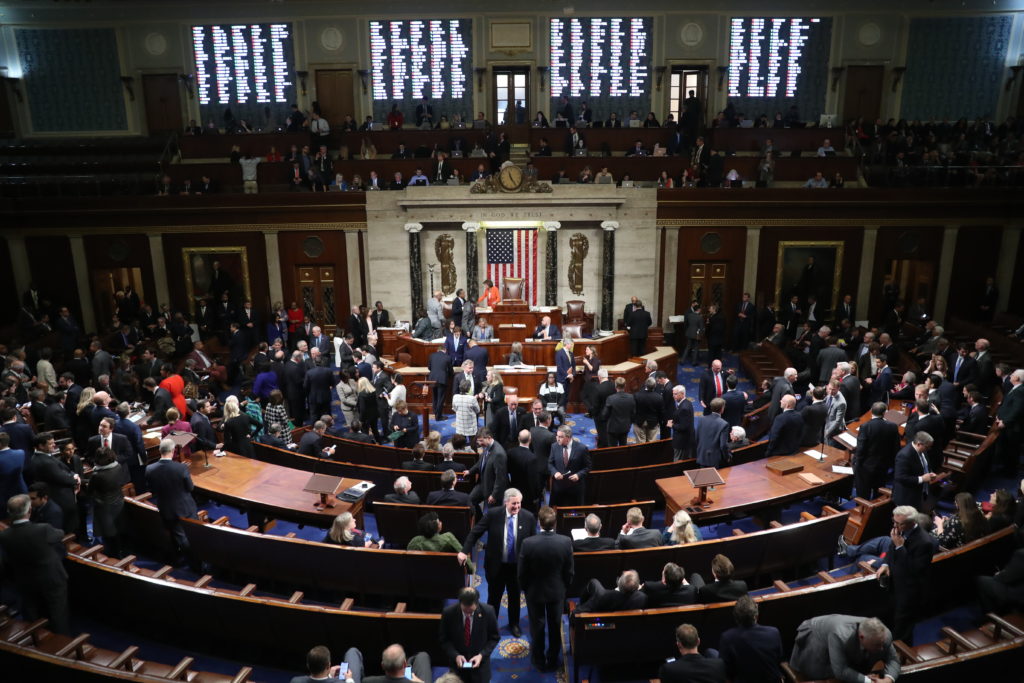
American history is happening in the U.S. House of Representatives. Democrats are driving President Donald Trump to the brink of impeachment Wednesday as the House takes up charges Trump abused his power and obstructed Congress in pressuring Ukraine to investigate political rivals and refusing to cooperate with the ensuing congressional probe. The nation’s 45th president is on track to become only the third commander in chief to be impeached. But first, watch for a daylong showdown that’s been boiling for years between Republicans loyal to Trump and Democrats who say his conduct toward Ukraine makes him unfit for office. Look, too, for legacy moments for Washington’s political veterans on the eve of the 2020 election year. What to watch during a historic day on Capitol Hill that begins at 9 a.m. EST and is expected to end with a final vote between 6:30 and 7:30 p.m.: SPOILER ALERT Trump is heading for impeachment. When the House opens debate, the outcome will have been known for some time. A tally compiled by The Associated Press found that a majority of House members have said they will vote to approve the charges and send them to the Senate for a trial next month. The GOP-led Senate is not expected to convict and remove Trump from office. PARTISANS, MOSTLY Expect most Democrats to vote for impeachment and all Republicans to vote against it. But there are exceptions. One freshman Democrat, Jeff Van Drew of New Jersey, has indicated he will oppose impeachment, then switch parties to become a Republican. Earlier this year, Michigan conservative Rep. Justin Amash left the GOP when he favored impeachment. He is expected to vote yes to impeach. One new Democratic congressman, Jared Golden of Maine, said he would vote to impeach on abuse of power but not obstruction. AMERICANS Expect the House to take the nation’s us-vs-them political culture out for a spin before a global audience. But it’s not clear the proceedings are changing many minds. Trump’s approval ratings have held steady since a whistle-blower report and a partial transcript revealed he had pressured Ukraine’s president to investigate Democrats. Wide shares of Democrats both disapprove of the president and support impeachment, while wide shares of Republicans approve of Trump and want him to remain in office. New polls from The Washington Post/ABC News and CNN find support for impeachment and removal remains at about half of Americans. ‘PROFOUND DISGRACE’ Impeachment will subject Trump to what former Presidents Gerald Ford and Jimmy Carter called a “profound disgrace” that stains a president’s legacy forever. Only two presidents have been impeached: Andrew Johnson in 1868 and Bill Clinton in 1998. Richard Nixon chose to resign instead. Trump has mocked the articles of impeachment as weak. TRUMP’S DAY He’s heading to Michigan, the Democratic state he flipped in 2016. Vice President Mike Pence is on a bus tour across the state and expected to join Trump at the rally in Battle Creek. On the eve of the floor action, Trump gave a nearly six-page preview of his approach in a rambling letter to House Speaker Nancy Pelosi. in which he cast himself as a victim and accused the Democrats of smarting over their election losses. “You are the ones bringing pain and suffering to our Republic for your own selfish, personal political and partisan gain.” PELOSI It’s legacy time for her, too. In her second turn as speaker, the House veteran of more than three decades says relentlessly that impeachment is a somber time, not one for celebration. She says the Clinton impeachment proceedings were too divisive for the county and resisted opening impeachment proceedings against President George W. Bush after the Iraq War. She refused to launch impeachment proceedings against Trump over his obstruction of the Russia investigation, saying she’d be against doing so unless there was bipartisan sentiment for it. That still doesn’t exist for the impeachment articles now headed for passage. But Pelosi has said Trump’s conduct toward Ukraine, while holding up military aid to that country, left her no choice. “Very sadly, the facts have made clear that the President abused his power for his own personal, political benefit and that he obstructed Congress,” Pelosi wrote to colleagues. “In America, no one is above the law.” NEXT STOP: SENATE After votes on each of the two amendments, the House is expected to authorize Pelosi to name a team of prosecutors for the Senate trial. Lobbying for the jobs is well underway. The wagering begins with the two lead House impeachment chairmen, Adam Schiff of Intelligence and Jerrold Nadler of Judiciary, playing roles. The trial is expected to begin in January, with Chief Justice John Roberts presiding. Senate Majority Leader Mitch McConnell and Minority Leader Chuck Schumer have begun negotiating, and sniping, over how the trial will be conducted. McConnell set the partisan tone by declaring that he’s “not an impartial juror.” By Laurie Kellman Associated Press Follow Kellman on Twitter at: http://www.twitter.com/APLaurieKellman Republished with the Permission of the Associated Press.
Darryl Paulson: Will Donald Trump be dumped? Part II — The Constitutional debate
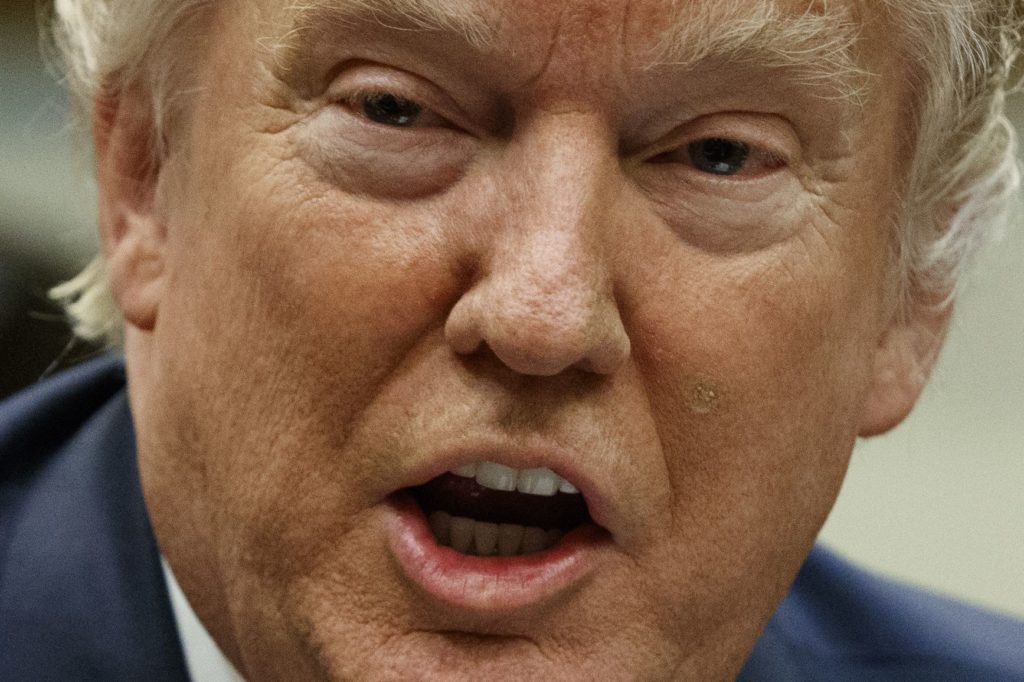
In my recent op-ed, I examined the possibility of removing President Donald Trump through the 25th Amendment. That amendment allows for the president to be removed if the vice president and a majority of the cabinet find the president “unable to discharge the powers and duties of his office.” This option is highly unlikely to succeed. Impeachment is the more likely problem confronting Trump, although the chances of success are minimal at this time. Impeachment and the Constitutional Convention. On July 20, 1787, delegates at the Constitutional Convention raised the issue of impeachment of a sitting president. The debate was heated. Charles Pinckney of South Carolina moved to strike impeachment from the Constitution. Pinckney contended that elections would hold the president accountable. George Mason of Virginia asked, “Shall any man be above Justice?” Gouverneur Morris of Pennsylvania moved that the impeachable offenses be enumerated and defined. James Madison of Virginia listed possible impeachable offenses. “He might lose his capacity after his appointment. He might pervert his administration into a scheme of peculation or oppression. He might betray his trust to foreign powers.” Many Trump critics see him guilty of the last charge. Pinckney and Rufus King of Massachusetts worried that impeachment would jeopardize the independence of the president. Eldridge Gerry of Massachusetts countered that “A good magistrate will not fear them (Congress). A bad one ought to be kept in fear of them.” The delegates at the Constitutional Convention gave the House the authority to bring articles of impeachment by majority vote. Impeachment, in contrast to the public perception, does not mean removal from office. It only means a majority of the House believes there are grounds for the Senate to hold hearings on whether or not to remove the president from office. General offenses included treason, bribery and other high crimes and misdemeanors. Presidential Impeachments. Andrew Johnson, a Democrat who assumed the presidency after the assassination of President Abraham Lincoln, was bitterly distrusted by the Radical Republicans who dominated Congress. Johnson, a Tennessean, was viewed as too sympathetic to the South. Johnson’s problems escalated after Congress passed the Tenure of Office Act in 1867, which required the president to get Senate approval before firing a cabinet officer. Johnson fired Secretary of War Edwin Stanton without seeking Senate approval. The House voted to impeach Johnson. After a three-month trial in the Senate, the Senate fell one vote short of the necessary two-thirds needed to remove the president. The vote was 35 to 19 in favor of removing Johnson, and seven Republicans voted to acquit. Over a century later, President Richard Nixon, who won a landslide victory over Democrat George McGovern in 1972, fell victim to the Watergate scandal. The scandal involved the effort of members of the president’s re-election team to break into the headquarters of the Democratic National Committee in the Watergate complex. Although Nixon denied any knowledge of the break-in, it later became known that the president had tapes of all the conversations in the Oval Office. The House brought articles of impeachment against the president and the primary charge was obstructing justice. During hearings by the Senate Watergate Committee, a number of Nixon aides gave damning testimony about the president’s involvement. After nine months, President Nixon became the first president to resign rather than face removal by the Senate. On Aug. 9, 1974, Nixon wrote that “I hereby resign the office of President of the United States.” During the Bill Clinton administration, an investigation into Arkansas land dealings by the Clintons while he was governor, ultimately led to his relationship with White House intern Monica Lewinsky. During the Senate hearings on whether to remove the president, his attorneys argued that Clinton was the victim of a partisan attempt to remove him from office for having consensual sex with Lewinsky. However abhorrent his personal conduct, the issue was not an impeachable offense. The public agreed and attacked Republicans for wasting time and money on trying to remove the president. Clinton is the only president to face impeachment and see his personal popularity rise. His approval rating climbed to over 70 percent, and the Senate fell far short of the two-thirds vote necessary to remove him from office. Part III Forthcoming: Will Trump be Dumped? Impeachment ___ Darryl Paulson is Emeritus Professor of Government at the University of South Florida in St. Petersburg specializing in Florida Politics and elections.


